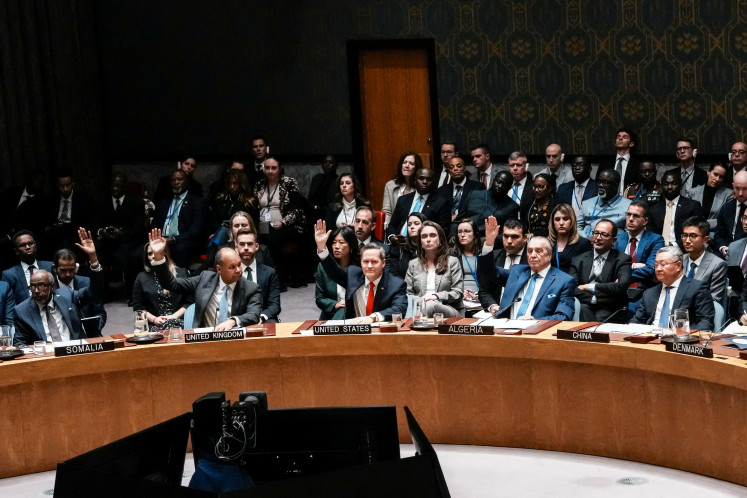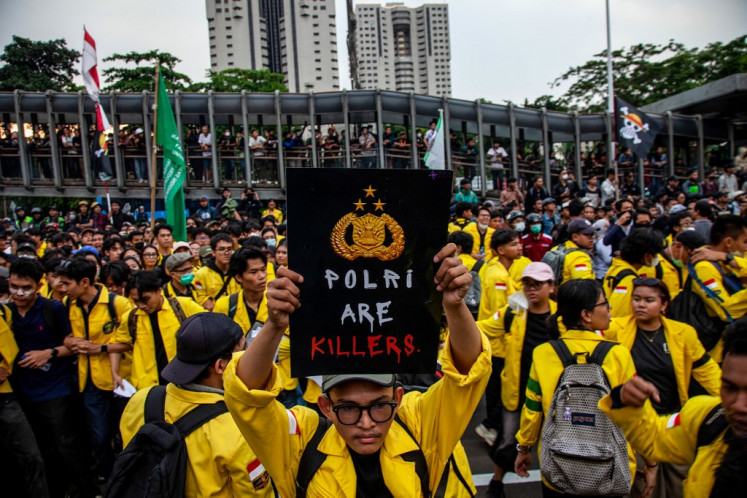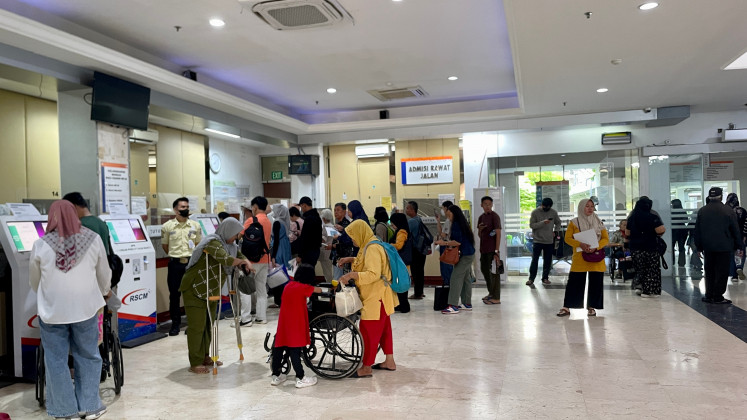Popular Reads
Top Results
Can't find what you're looking for?
View all search resultsPopular Reads
Top Results
Can't find what you're looking for?
View all search resultsIndonesia should reduce deforestation
Helen clarkAs the most powerful woman at the UN at the moment, UN Development Programme (UNDP) head Helen Clark is touted as one of the front-runners to fill the seat of UN secretary-general once incumbent Ban Ki-moon steps down in 2017
Change text size
Gift Premium Articles
to Anyone
Helen clark
As the most powerful woman at the UN at the moment, UN Development Programme (UNDP) head Helen Clark is touted as one of the front-runners to fill the seat of UN secretary-general once incumbent Ban Ki-moon steps down in 2017. The former New Zealand prime minister recently visited Jakarta to meet President Joko Widodo, ministers and the legislature. The Jakarta Post's Hans Nicholas Jong spoke to Clark on her last day in Jakarta, when she talked about Indonesia's role in the upcoming Paris Climate Conference and what the country should do in terms of its post-2015 development agenda.
Question: What do you think of Indonesia's program in tackling climate change issues, particularly its REDD+ agenda? Do you think the country is on the right track?
Answer: Indonesia has this target of greenhouse gas emission reduction. Twenty-six percent reduction if business as usual but if with international support, they say 41 percent. Now, this target cannot be met without tackling deforestation. To meet the 26 percent reduction, 80 percent of the reduction would have to come from the forests. So Indonesia can't make a major impact on its greenhouse gas emissions, which are significant, unless it stops deforestation. This is a critical political agenda that Indonesia needs to do for its own sake. But it also has a position of global leadership and Indonesia should keep that leadership.
What role do you think Indonesia should play in the upcoming Paris Climate Conference? How important is it for the country's development agenda?
I think Indonesia, as a major emerging economy, people will listen to what Indonesia says it will do. I think Indonesia definitely needs to be thinking about its intended national contribution. It has to submit it by the end of March. What is Indonesia going to do to reduce its greenhouse gas emissions? And that's why this issue of deforestation really has to be continued because for a meaningful contribution toward reducing greenhouse gases, you can't overlook the forests. If Indonesia continues to commit to ambitious targets, it will be influential in supporting other countries to make the commitments.
What do you expect from the Paris Climate Conference? What obstacles could be expected that might prevent an agreement being reached?
My feeling is that there is a momentum for agreement. The issue is how strong it will be. We've always been told, and going back to my time as a prime minister of New Zealand, that if the world temperature [increased by] over two degrees Celsius, we would face catastrophic change. Now we are seeing serious incredible forecasts that talk about the world being on track for six degrees, or five degrees.
So suddenly it's more than two degrees. It's a very serious situation. If we look at Typhoon Haiyan in the Philippines, we see the face of the future, which we will see more often and more extreme unless we can turn the tide on global warming. So at the moment, when the UN environment program measures the gap in what countries have committed to do and what needs to be done, there's a gap. Can that gap
be bridged by the Paris Climate Conference? Maybe not. So Paris
will be important but we will need a lot more ambition on what countries are prepared to do to reduce emissions.
How can we have that ambition?
I think that funding is important. The Green Climate Fund needs to be properly capitalized and seen to work. Developed countries are expected to have a column of different responsibilities because the stock of carbon in the atmosphere historically has largely been accrued by today's rich countries. They are expected to do more to get it down. But having said that, even if the developed countries eliminate their greenhouse gas emissions, that would not solve the problem. So we do need large emerging countries like Indonesia, Brazil, China and India to become fully on board now with the commitment to transformation to a green economy.
Indonesia has made steady progress and even achieved several of the Millennium Development Goals (MDGs). Yet, the country is off track on some of its goals, such as reducing the maternal mortality rate, providing safe drinking water, reducing the spread of HIV/AIDs. What could the government do differently to ensure that it could be on track post-2015?
One of the issues that is likely to be much more explicitly tackled is the issue of inequality because there's a widespread concern of growing inequality. And Indonesia has growing inequality, something that the government, the President and the National Development Planning Board (Bappenas) are very worried about. It is something that we had talked about this afternoon. We estimate that 70 percent of people in developing countries today live in countries that are less equal than they were in 1990. So this is very much a problem.
So for Indonesia in the new goals, I think it will want to grab the inequality focus and say 'we want less inequality. We want to do something about this'. There's also the unfinished business from the MDGs. So Indonesia still has a too-high maternal mortality rate. Child nutrition is also quite a serious issue with a significant number of children with stunted growth. HIV is going in the wrong direction at the moment. Infection is picking up. And then poverty, with 100 million Indonesians living on under US$2 a day. So this is a big agenda for Indonesia to develop in an inclusive way, a more sustainable way.
What is the UNDP going to do to reduce inequality?
We are putting a lot of attention on inequality because the higher the level of inequality, the harder it is to reduce poverty because you have people who are marginalized and excluded so they just miss out. So the way we would work with the government is first to identify where the big differences are. You have to map it. And then you have to have proper strategies. The new President has launched his three cards, on education, health and cash transfers. And that's a great start because that starts to give equal access to services. We can help target by the human development index. We can exchange ideas around the kinds of policies we've seen have worked around the world in order to support the government to get the best use of the money that it's got for tackling these differences. And as the President pointed out today when we spoke, by radically reducing the fuel subsidy, they have got $3 billion more in the budget than they had before. So there is some room to really target these big gaps.










